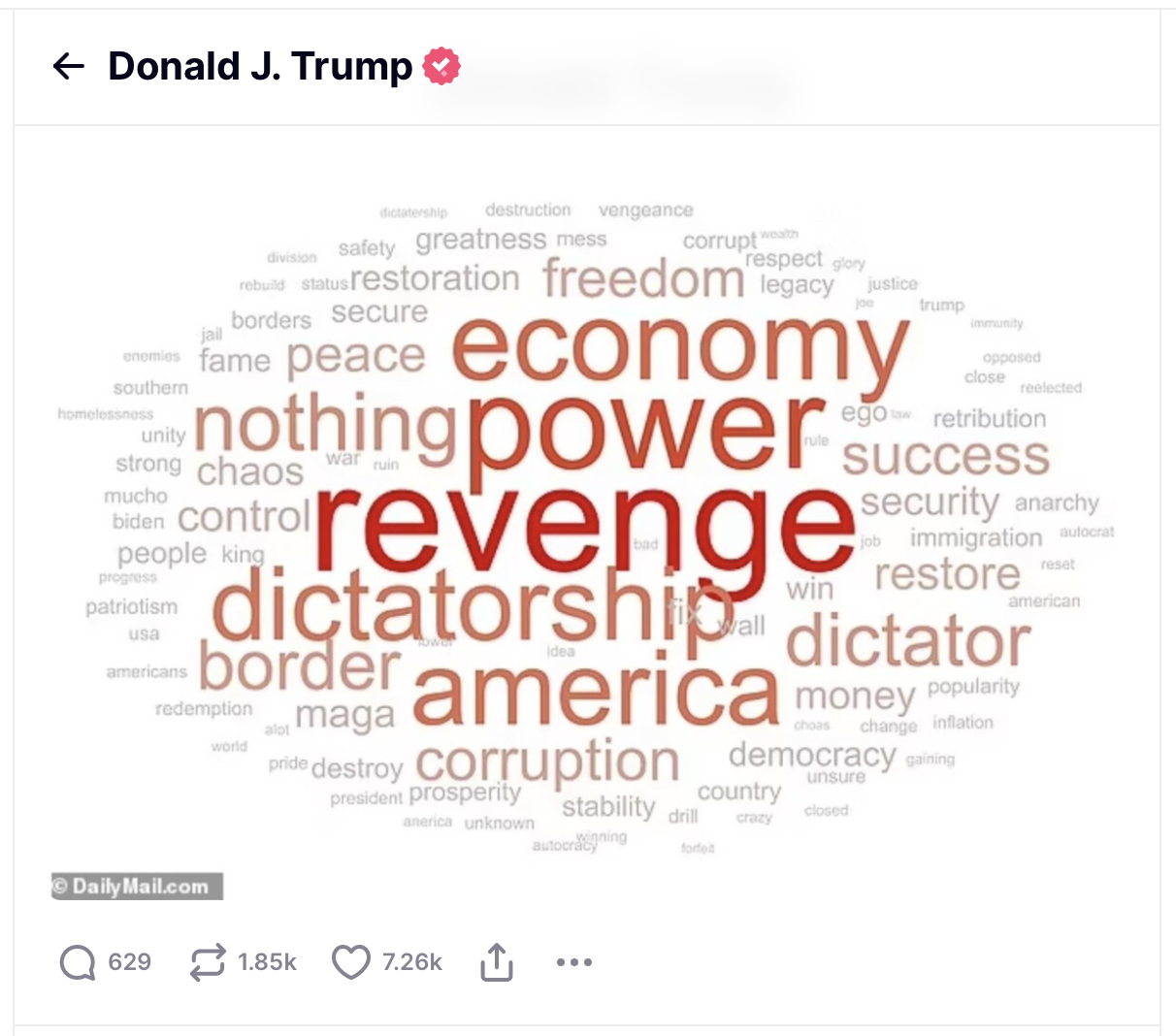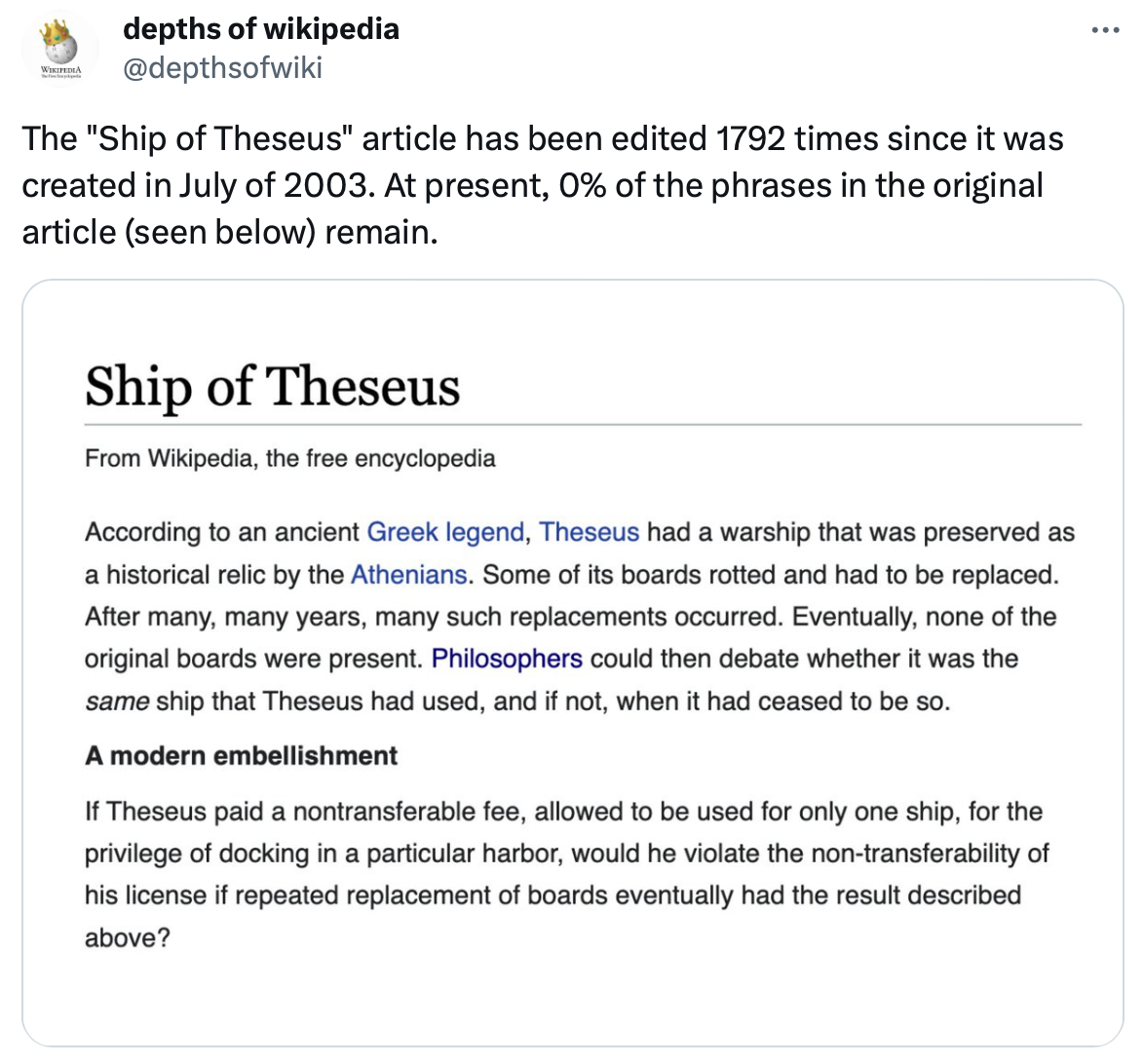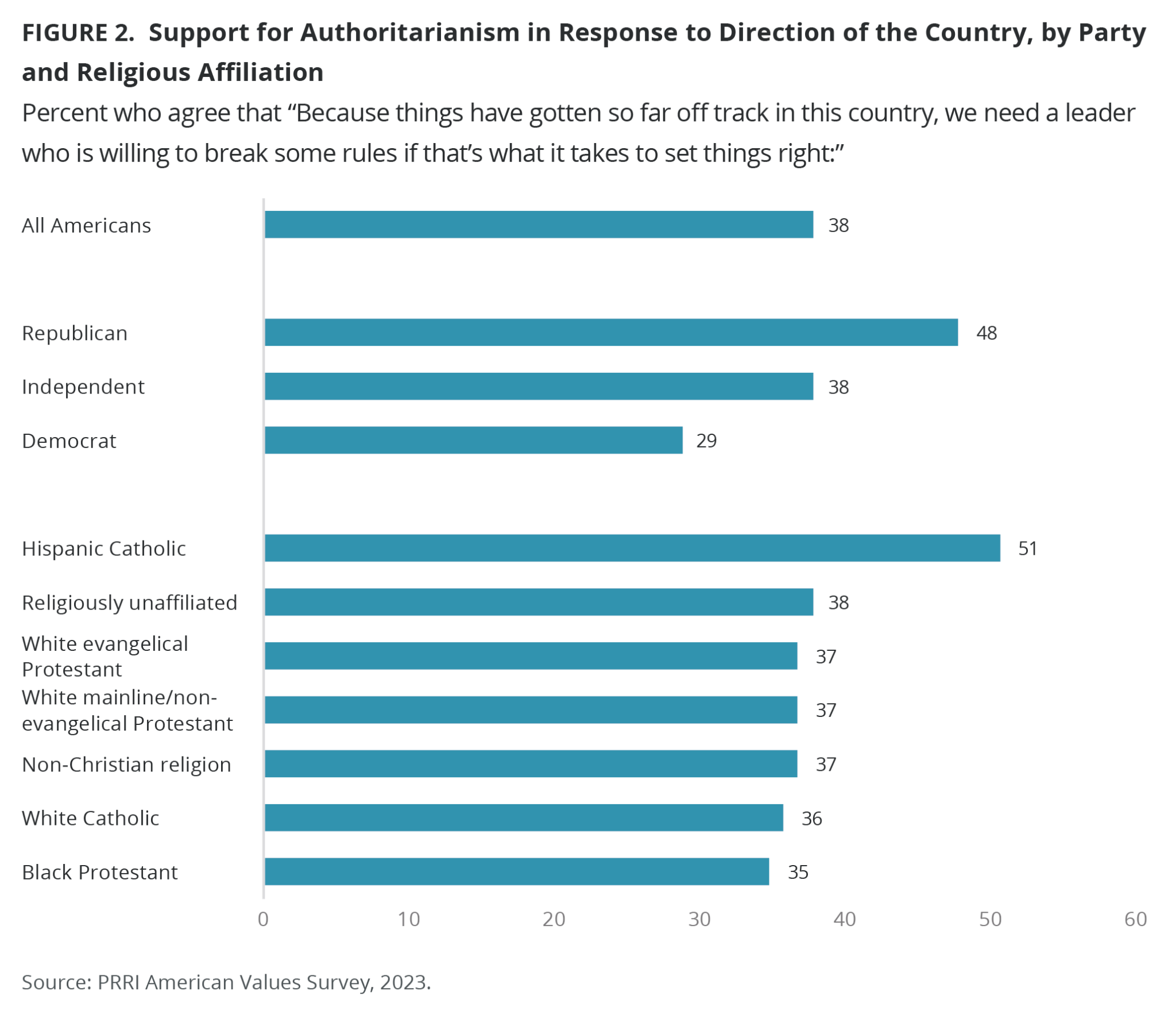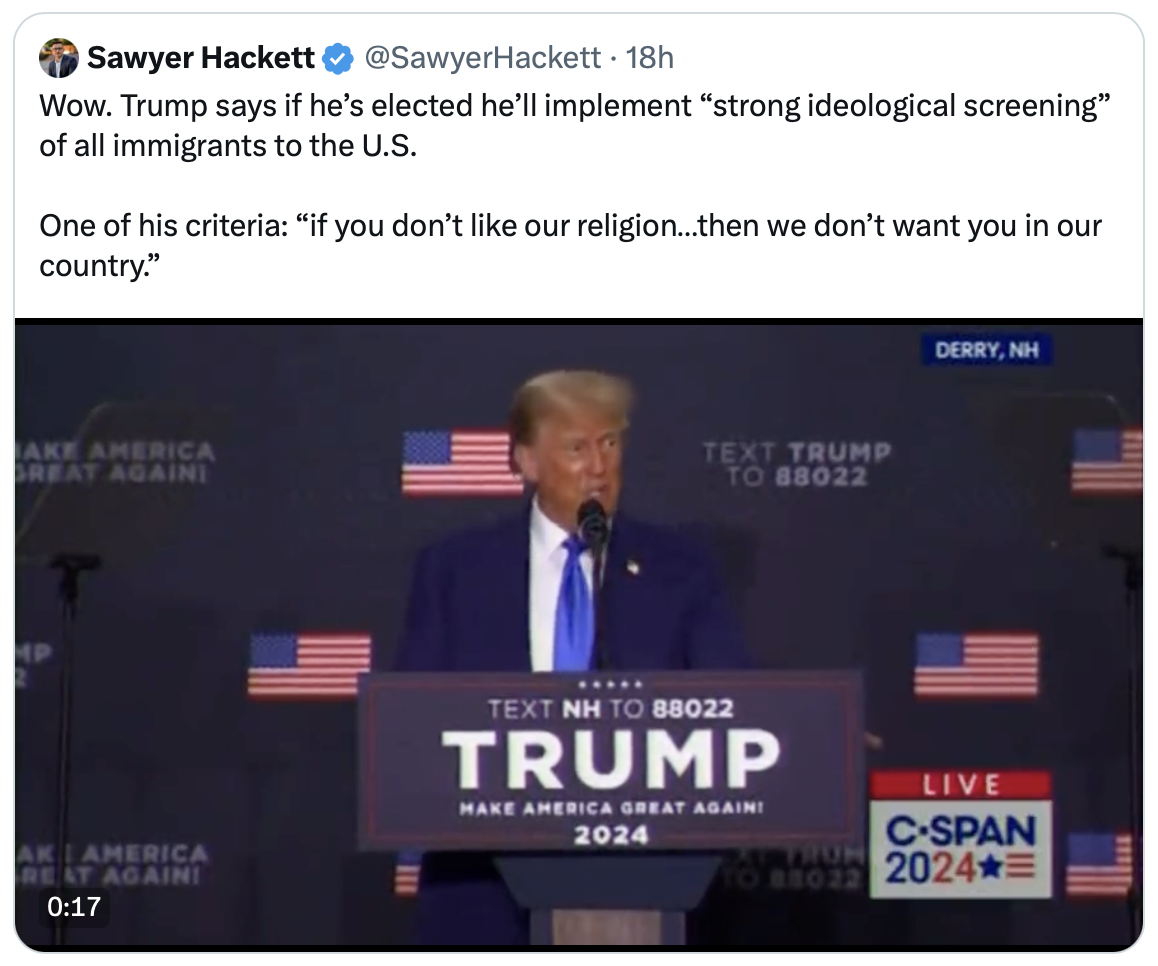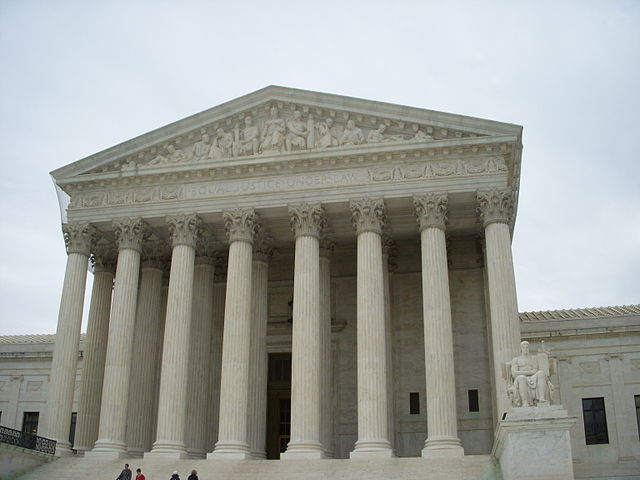Today’s Lineup
President Biden campaigns in defense of democracy, the Trump supporters who believe he’s been chosen by God to rule, the toxic mix of Christian Nationalism and authoritarianism, what a dictator on day one could do with executive orders, our health care system fails people with difficult to determine ailments, forced-birth advocates are criminalizing pregnancy outcomes, the failed promise of police body cameras, how freedom feels for a man exonerated after 48 years of false imprisonment, we are different from previous generations of humans, and how those QR codes work.
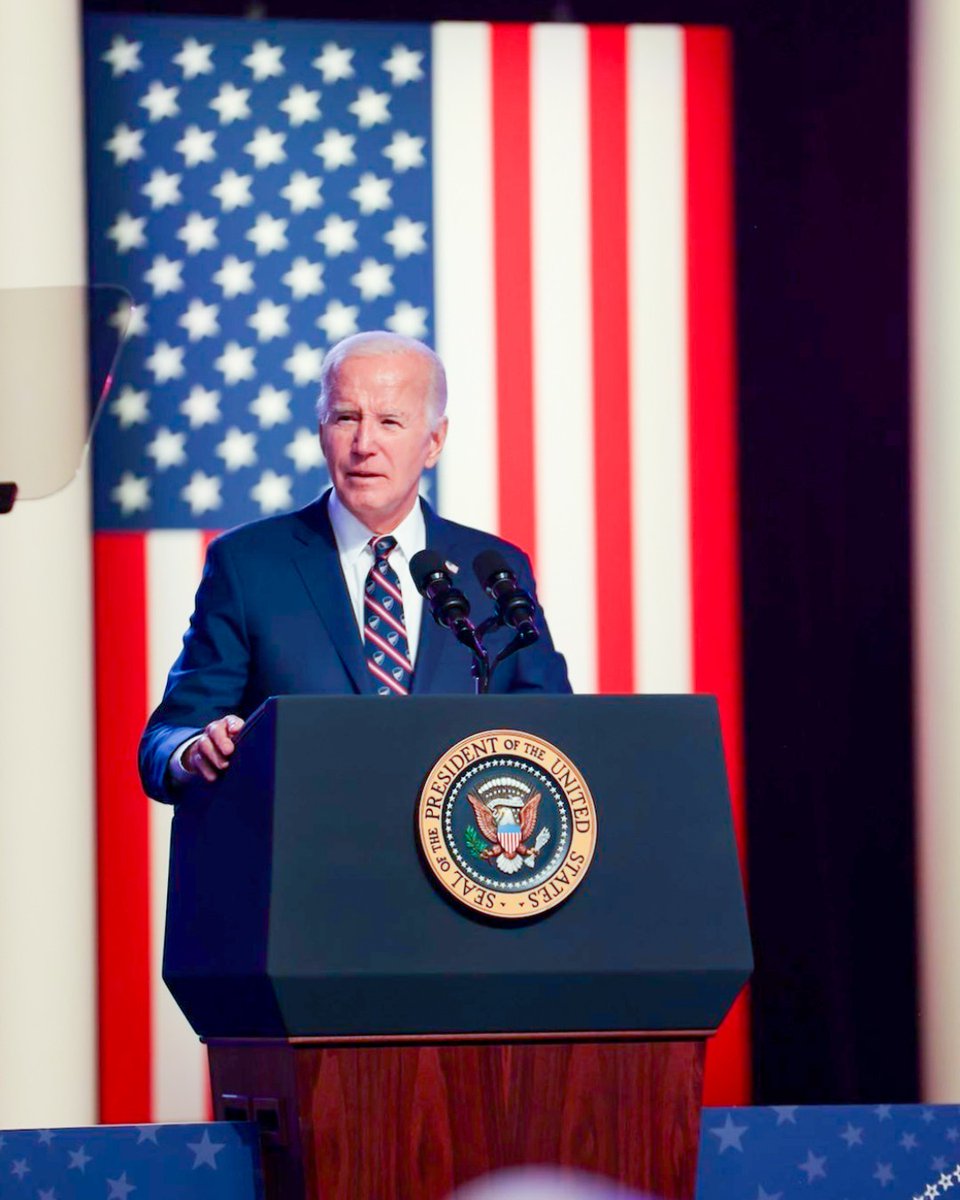
#1
Remarks by President Biden on the Third Anniversary of the January 6th Attack and Defending the Sacred Cause of American Democracy (President Joe Biden, White House Briefing Room)
In trying to rewrite the facts of January 6th, Trump is trying to steal history the same way he tried to steal the election. But he — we knew the truth because we saw it with our own eyes. It wasn’t like something — a story being told. It was on television repeatedly. We saw it with our own eyes.
Trump’s mob wasn’t a peaceful protest. It was a violent assault. They were insurrectionists, not patriots. They weren’t there to uphold the Constitution; they were there to destroy the Constitution.
Trump won’t do what an American president must do. He refuses to denounce political violence.
So, hear me clearly. I’ll say what Donald Trump won’t. Political violence is never, ever acceptable in the United States political system — never, never, never. It has no place in a democracy. None. (Applause.)
You can’t be pro-insurrectionist and pro-American.
WHY I FIND IT INTERESTING:
This! This! A million times this! Thank you, President Biden, for laying out the stakes of the 2024 election so clearly. This speech was outstanding—and sadly necessary. After a few days of widespread agreement about what happened on January 6, 2021, Republicans have been trying to rewrite that day’s history since former House Speaker Kevin McCarthy made his trip to bend the knee to the former president at his Mar-a-Lago resort. House Republican Conference Chairwoman Elise Stefanik continued these efforts over the weekend on Meet the Press, where she talked about the “January 6 hostages” and refused to promise to accept the results of the 2024 election. So let’s be clear: our democracy barely survived the attack on the Capitol on January 6, 2021, and Donald Trump and his supporters are focused on finishing the job this time around. I hope you’ll take the time to watch President Biden’s speech if you missed it. Here’s a recording from C-SPAN.
Things I Find Interesting is a reader-supported publication. To receive new posts and support my work, consider becoming a free or buy me a coffee by becoming a paid subscriber.
#2
Many Trump supporters believe God has chosen him to rule (The Economist)
For years scholars have tried to explain why conservative Christians so avidly support Donald Trump, a man who is more intimately acquainted with the seven deadly sins than the contents of the Bible. Some chalk it up to Mr Trump’s conservative policies. (He appointed the judges who gave back to the states the power to ban abortion.) Others think they share Mr Trump’s nostalgia for America’s past—an era when white Christians dominated the country. Yet another factor may also have played a role: the belief that Mr Trump was anointed by God to lead the country.
In 2016 a self-styled prophet named Lance Wallnau had a vision: the next president would be a latter-day Cyrus, the Persian emperor who, though not Jewish, was chosen by God to free the Jews from captivity. Mr Wallnau proclaimed Mr Trump, then a Republican candidate, the Cyrus of his dreams. The message was, even though he is not evangelical, “Trump is sent by God to deliver conservative Christians back from cultural exile,” says Matthew Taylor of the Institute for Islamic, Christian and Jewish Studies in Maryland.
WHY I FIND IT INTERESTING:
Insurrectionist Donald Trump’s hold on evangelical Christians has been one of the most important dynamics of our politics since the former president descended from the golden escalator and announced his 2016 campaign for president. The Economist explains how Trump has managed to keep so many conservative Christians as enthusiastic supporters by looking into the teachings of the New Apostolic Reformation. The group’s followers were key leaders of the January 6, 2021, insurrection against the lawful government of the United States. As the article explains, “Many protesters brandished flags emblazoned with the words “An Appeal to Heaven”, the apostles’ rallying cry for a Christian conquest of America.” We should also be aware that Speaker of the House Mike Johnson has displayed that flag outside his Congressional office. I don’t think that’s a coincidence.
#3
The Only Thing More Dangerous Than Authoritarianism (Tim Alberta, The Atlantic)
The crisis at hand is not simply that Christ’s message has been corroded, but that his Church has been radicalized. The state-ordered closings of sanctuaries during COVID-19, the conspiracy-fueled objections to Joe Biden’s victory in 2020, the misinformation around vaccines and educational curricula—these and other culture-war flash points have accelerated notions of imminent Armageddon inside American Christendom. A community that has always felt misunderstood now feels marginalized, ostracized, even persecuted. This feeling is not relegated to the fringes of evangelicalism. In fact, this fear—that Christianity is in the crosshairs of the government, that an evil plot to topple America’s Judeo-Christian heritage hinges on silencing believers and subjugating the Church—now animates the religious right in ways that threaten the very foundations of our democracy.
WHY I FIND IT INTERESTING:
It is impossible to understand the authoritarian turn in the Republican party without grappling with the rise of Christian nationalism within the party. Alberta has regularly raised this alarm from the perspective of a believer. He explains how a 50-year effort of “weaponizing the Gospel to win elections” has been accelerated by Trump, the COVID-19 pandemic, and immigration. History warns us about how dangerous the mix of authoritarianism and religious fanaticism can be. Will we listen?
#4
Dictator On Day One: The Executive Orders That Trump Would Issue From The Start (Josh Kovensky, Talking Points Memo)
On his first days in office, Trump is planning on issuing orders which would end birthright citizenship, give himself the authority to fire tens of thousands of federal civil servants, and force federal bureaucrats to obey culture war dictates.
Through executive action, Trump plans to proclaim extreme new interpretations of baseline provisions of the Constitution, dramatically expanding the reach of presidential authority while upturning principles of law and American society, like birthright citizenship, that for decades have been taken for granted. Many of the proposed orders are likely to spark court fights, setting up legal battles over bedrock issues destined for a 6-3 conservative Supreme Court.
Other proposed day-one orders lean into the culture wars with real-world consequences, like one which would bar federal agencies from running programs supporting gender-transition education.
WHY I FIND IT INTERESTING:
We are fortunate that Trump and his supporters are being so transparent about their intentions. We know how many people a second Trump administration plans to harm. Despite our frustrations, we must do whatever we can to prevent this outcome. As Reed Galen wrote in response to Democratic campaign staffers writing yet another anonymous protest memo, “There are also no “moral victories” in politics. It’s a binary outcome. A candidate wins or loses. The continuation of democracy, the American experiment, and America itself depends on ensuring Donald Trump never returns to the White House.” I wish the 2024 election was about something else. I wish ten more Republican Senators had voted to convict Trump during his second Impeachment trial and made clear he was ineligible to run again. I wish death treats from MAGA supporters didn’t keep Republican leaders from endorsing Trump this time around. But my wishes don’t change our reality.
Thank you for reading Things I Find Interesting. This post is public so feel free to share it with your family and friends.
#5
My Unraveling: I had my health. I had a job. And then, abruptly, I didn’t. (Tom Scocca, Intelligencer)
Maybe, the cardiologist said, eyeing my scrawny limbs and loose clothes, I should consider checking into a hospital. Just so I could get all my testing coordinated in one place.
It was only a thought, one that dissipated as I sought out second opinions. The medical-mystery column doesn’t usually dwell on how slowly the inquiry goes in our fractured health-care system. How the highly recommended pulmonologist doesn’t return the first phone call and only has an opening five months away, and how the major-medical center does have an appointment but isn’t in network with the major-medical insurer. How the chest X-ray is over by the East River and the breathing booth is in the West 160s and the phlebotomist is by Columbia, and how each one has its own online portal for billing and results.
WHY I FIND IT INTERESTING:
Tom Scocca writes about how an unknown illness, COVID, and our horrifying employer-based health insurance system combined in a Kafkaesque fashion. We see, once again, how getting someone healthy is not our society’s priority. Having an unknown illness is stressful enough. But how are people supposed to focus on recovering given the financial strains and other stresses created by navigating a health insurance system designed to deny us care?
#6
The Year in Abortion: Criminalization (Jessica Valenti, Abortion, Every Day)
Let’s be clear: Republicans aren’t interested in stopping abortions or saving ‘babies’—they simply want to hurt those who would see women be free. The punishment has always been the point.
And despite assurances that they have no interest in targeting abortion patients, the GOP worked overtime this year to ensure that women who have the temerity to decide their own lives and futures be punished for it.
A Nebraska teenager who self-managed her abortion. An Ohio woman prosecuted for flushing her miscarriage. Story after story this year proved just how much the GOP plans to make examples of the most marginalized among us.
But criminalization in 2023 went far beyond individual punishment—the broader goal is to stop us from helping each other in a moment when help is needed most. There were bills to ban pro-choice websites, local ordinances that made lending someone money or sharing information about abortion illegal—even a law in Idaho that would punish professors with prison time for “promoting” abortion.
WHY I FIND IT INTERESTING:
We should be clear about what forced-birth judges and politicians have been doing across the country since the Supreme Court overturned Roe v. Wade. While their rhetoric often downplays their desire to criminalize pregnancy outcomes, their decisions and legislation tell a straightforward story. Republican politicians continue to propose outrageous laws in the hopes that voters will normalize their ideas. That’s why we need to be quite clear about the realistic ramifications of what forced-birth advocates propose. Jessica Valenti’s Abortion, Every Day newsletter is an essential resource to see how these efforts build upon each other. I hope voters will continue to reject these policies as long as we have the opportunity to do so.
#7
The Failed Promise of Police Body Cameras (Eric Umansky, The New York Times and ProPublica)
When body-worn cameras were introduced a decade ago, they seemed to hold the promise of a revolution. Once police officers knew they were being filmed, surely they would think twice about engaging in misconduct. And if they crossed the line, they would be held accountable: The public, no longer having to rely on official accounts, would know about wrongdoing. Police and civilian oversight agencies would be able to use footage to punish officers and improve training. In an outlay that would ultimately cost hundreds of millions of dollars, the technology represented the largest new investment in policing in a generation.
Yet without deeper changes, it was a fix bound to fall far short of those hopes. In every city, the police ostensibly report to mayors and other elected officials. But in practice, they have been given wide latitude to run their departments as they wish and to police — and protect — themselves. And so as policymakers rushed to equip the police with cameras, they often failed to grapple with a fundamental question: Who would control the footage? Instead, they defaulted to leaving police departments, including New York’s, with the power to decide what is recorded, who can see it and when. In turn, departments across the country have routinely delayed releasing footage, released only partial or redacted video or refused to release it at all. They have frequently failed to discipline or fire officers when body cameras document abuse and have kept footage from the agencies charged with investigating police misconduct.
WHY I FIND IT INTERESTING:
I do not believe any institution can oversee its own actions effectively. The police are particularly ineffective at it, repeatedly choosing to protect its members instead of the public. As this investigation examines, police departments frequently withhold body camera footage—even in cases of police violence and misconduct. Politicians have rewarded this bad conduct, and these dynamics have led to civilian injuries, deaths, and wrongful convictions. Law enforcement agencies should no longer be given the benefit of the doubt when it comes to requirements to be more transparent.
#8
Glynn Simmons: Freedom ‘exhilarating’ for man exonerated after 48 years (Madeline Halpert, BBC News)
Mr Simmons was released from prison in July 2023. In December he was declared innocent in the 1974 murder of Carolyn Sue Rogers. His is the longest known wrongful conviction in the US.
His sentence was vacated after a district court found that prosecutors had not turned over all evidence to defence lawyers, including that a witness had identified other suspects.
He was 22 when he and a co-defendant, Don Roberts, were convicted and sentenced to death in 1975, a punishment that was later reduced to life in prison.
Mr Simmons spoke to the BBC this week about his newfound freedom, his current battle with Stage 4 cancer and the hope that carried him through 48 years behind bars.
“Being innocent, it helps you to keep your faith,” he said. “I would be lying if I said I didn’t lose my faith, lots of times. But it’s like a rubber band – you expand and you return.”
WHY I FIND IT INTERESTING:
Speaking of law enforcement misconduct, I am glad that Glynn Simmons is enjoying his freedom after 48 years of wrongful imprisonment. Yes: 48 years. But his case highlights the need to ensure wrongfully convicted people can access the resources required to appeal their convictions—especially when prosecutor or police misconduct is uncovered or scientific advances expose new possibilities for examining evidence. But some radical conservatives, like Virginia Attorney General Jason Miyares, have taken resources that were dedicated to helping the wrongfully convicted and transferred them to use on culture war issues. Voters should check that impulse. We also should do more to compensate people who have been wrongfully imprisoned. Oklahoma, for example, has a maximum compensation of $175,000—and it could take years before Simmons sees a dime. A goal of our criminal justice system should be accuracy—not fighting to keep wrongful convictions in place.
#9
We are different from all other humans in history (Brian Klaas, The Garden of Forking Paths)
I recently visited my family in the US and managed to defeat transatlantic jet lag in one night—a small miracle. But as I patted myself on the back for my unusual sleeping prowess, I considered an astonishing fact: in the history of humanity, just three and a half generations of human beings have been able to experience jet lag.
The phenomenon was only identified in 1931. Before that, it wasn’t possible for a human to travel far enough fast enough to knock their internal circadian rhythms out of sync. Our technological prowess created a novel biological experience that was impossible for roughly 9,497 out of the 9,500 or so generations of Homo sapiens.
We, the modern humans who are alive today, are unique.
WHY I FIND IT INTERESTING:
It is remarkable how much has changed so quickly for our species. In 1914, it would take someone up to 40 days to reach some of the remote places on the planet from London. Now? It takes 36 hours. As Klass explains, “The furthest reaches of inaccessible terrain on our planet are now far easier to reach from London than were most places in Western Europe a century ago.” (Klass includes maps demonstrating this transition.) Klass discusses how this change—and other advancements like our global communications networks and how often children are now teaching older generations essential skills—have impacted how humans interact. It was great to take some time away from current news to consider how much we take advantage of today would have been impossible to imagine just three or four generations ago.
The Closer

The Quick Response code, known as the QR code, has become more ubiquitous since the beginning of the COVID-19 pandemic. But how do they work? Dan Hollick takes a deep dive into what those black dots and white spaces mean and how they work to transmit information. They have come a long way since the Japanese company Denso Wave created them in 1994 to track automobile parts inventory.
Post-Game Comments
Today’s Thought from my Readwise collection:
“If the American Republic falls, democracy as the leading political system in the world falls. If democracy falls, the peace and security of the global order falls. No one will escape the consequences.” (Stephen Marche, The Next Civil War)
Thank you for reading Things I Find Interesting. This post is public so feel free to share it.
Thank you for reading my newsletter. Let me know what you think about what you’ve read. Send me things you’ve found interesting! You can email me at craigcheslog@substack.com.
Please help me spread the word about this newsletter by sharing this post via email or on the social media network of your choice. And if you haven’t already, please consider signing up for a free or paid subscription.
